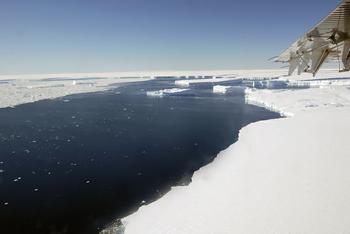 科學家於8月14日發出警告,南極洲一個巨大冰河消融的速度正在加速當中,並稱此情況「令人震驚。」南極洲西部的松島冰河(Pine Island Glacier)消融的速度為十年前的4倍。
科學家於8月14日發出警告,南極洲一個巨大冰河消融的速度正在加速當中,並稱此情況「令人震驚。」南極洲西部的松島冰河(Pine Island Glacier)消融的速度為十年前的4倍。
研究還顯示目前冰層消融的情況越來越深入內陸。按這速度科學家估計,主體冰河部分將會在短短100年中消失,比之前所認爲的速度快6倍。
該研究的作者之一,英國里茲大學地球與環境系謝泊德(Andrew Shepherd)教授表示:「消融速度加劇的松島冰河也許意味著今天冰凍圈中一個最嚴重的不平衡現象。但如果沒有一系列衛星儀器的輔助,我們也不會對該現象有所瞭解。」
松島冰河位於南極洲最偏遠的地區 - 距離最近的研究基地有1,000多公里( 600英里)-- 因而多年一直被忽視。
現在,科學家已經能夠藉著過去15年完整無間斷的衛星測量來追踪冰河的發展過程。
即便科學家表示,將目前的趨勢歸結為全球暖化還言之過早,但卻相信,南極洲該部份冰河消退的原因乃是拜周邊海洋暖化之賜。
目前整個松島冰河受到影響共計5,400平方公里(2,084平方英里)的地區,大到足以影響全球海平面上升的速度。
全球的科學家對松島冰河非常感興趣,因為該地區每年冰河消融的速度在1公尺以上。同時,過去15年來其流量也愈來愈大。
英國南極調查所(BAS)的科學家表示,環繞松島冰河外圍更廣濶的區域是南極冰蓋變化最迅速的部分,並且其未來對海平面上升的影響可能是「非常重要的。」
美國航太總署(NASA)用雷達研究冰河的科學家表示,「松島冰河快速消退,預計將有可能觸發南極西部冰原的解體,歸結為暖化的海水進一步融化漂浮冰舌底部的原因所致。」
The thinning of a gigantic glacier in Antarctica is accelerating, scientists warned today, calling the loss of ice "alarming." The Pine Island Glacier in West Antarctica is losing ice four times as fast as it was a decade ago.
The research also reveals that ice thinning is now occurring much further inland. At this rate scientists estimate that the main section of the glacier will have disappeared in just 100 years, six times sooner than was previously thought.
"Accelerated thinning of the Pine Island Glacier represents perhaps the greatest imbalance in the cryosphere today, and yet we would not have known about it if it weren't for a succession of satellite instruments," says Professor Andrew Shepherd, a co-author of the research from the School of Earth and Environment at the University of Leeds.
The Pine Island Glacier is located within the most inaccessible area of Antarctica - over 1,000 km (600 miles) from the nearest research base - and was for many years overlooked.
Now, scientists have been able to track the glacier's development using continuous satellite measurements over the past 15 years.
Scientists believe that the retreat of glaciers in this sector of Antarctica is caused by warming of the surrounding oceans, though they say it is too early to link such a trend to global warming.
The 5,400 square kilometer (2,084 square mile) region of the Pine Island Glacier affected today is big enough to impact the rate at which sea levels are rising around the world.
The Pine Island Glacier is of great interest to scientists worldwide as it has been thinning at a rate of more than one meter per year and its flow rate has accelerated over the past 15 years.
The BAS scientists said, the wider region within which Pine Island Glacier lies is the most rapidly changing portion of the Antarctic ice sheet and its future impact on sea-level rise could be "very significant."
"The fast recession of Pine Island Glacier, predicted to be a possible trigger for the disintegration of the West Antarctic Ice Sheet, is attributed to enhanced basal melting of the glacier floating tongue by warm ocean waters," say NASA scientists who conducted radar studies of the glacier.






